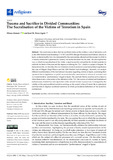Mostrar el registro sencillo del ítem
Trauma and sacrifice in divided communities: the sacralisation of the victims of terrorism in Spain
| dc.creator | Alemán Salcedo, Eliana Margarita | es_ES |
| dc.creator | Pérez-Agote Aguirre, José María | es_ES |
| dc.date.accessioned | 2024-01-11T12:12:41Z | |
| dc.date.available | 2024-01-11T12:12:41Z | |
| dc.date.issued | 2021 | |
| dc.identifier.citation | Alemán, E., Pérez-Agote, J.M. (2021) Trauma and sacrifice in divided communities: The sacralisation of the victims of terrorism in Spain. Religions, 12(2), 104. https://doi.org/10.3390/rel12020104. | en |
| dc.identifier.issn | 2077-1444 | |
| dc.identifier.uri | https://hdl.handle.net/2454/46985 | |
| dc.description.abstract | This work aims to show that the sacrificial status of the victims of acts of terrorism, such as the 2004 Madrid train bombings (“11-M”) and ETA (Basque Homeland and Liberty) attacks in Spain, is determined by how it is interpreted by the communities affected and the manner in which it is ritually elaborated a posteriori by society and institutionalised by the state. We also explore the way in which the sacralisation of the victim is used in socially and politically divided societies to establish the limits of the pure and the impure in defining the “Us”, which is a subject of dispute. To demonstrate this, we first describe two traumatic events of particular social and political significance (the case of Miguel Ángel Blanco and the 2004 Madrid train bombings). Secondly, we analyse different manifestations of the institutional discourse regarding victims in Spain, examining their representation in legislation, in public demonstrations by associations of victims of terrorism and in commemorative “performances” staged in Spain. We conclude that in societies such as Spain’s, where there exists a polarisation of the definition of the “Us”, the success of cultural and institutional performances oriented towards reparation of the terrorist trauma is precarious. Consequently, the validity of the post-sacrificial narrative centring on the sacred value of human life is ephemeral and thus fails to displace sacrificial narratives in which particularist definitions of the sacred Us predominate. | en |
| dc.format.mimetype | application/pdf | en |
| dc.language.iso | eng | en |
| dc.publisher | MDPI | en |
| dc.relation.ispartof | Religions 2021, 12, 104 | en |
| dc.rights | © 2021 by the authors. Licensee MDPI, Basel, Switzerland. This article is an open access article distributed under the terms and conditions of the Creative Commons Attribution (CC BY) license. | en |
| dc.rights.uri | http://creativecommons.org/licenses/by/4.0/ | |
| dc.subject | Sacrifice | en |
| dc.subject | Cultural trauma | en |
| dc.subject | Victims of terrorism | en |
| dc.subject | Ritual | en |
| dc.subject | Performance | en |
| dc.title | Trauma and sacrifice in divided communities: the sacralisation of the victims of terrorism in Spain | en |
| dc.type | Artículo / Artikulua | es |
| dc.type | info:eu-repo/semantics/article | en |
| dc.date.updated | 2024-01-11T09:18:28Z | |
| dc.contributor.department | Sociología y Trabajo Social | es_ES |
| dc.contributor.department | Soziologia eta Gizarte Lana | eu |
| dc.contributor.department | Institute for Advanced Social Research - ICOMMUNITAS | es |
| dc.rights.accessRights | Acceso abierto / Sarbide irekia | es |
| dc.rights.accessRights | info:eu-repo/semantics/openAccess | en |
| dc.identifier.doi | 10.3390/rel12020104 | |
| dc.relation.publisherversion | https://doi.org/10.3390/rel12020104 | |
| dc.type.version | Versión publicada / Argitaratu den bertsioa | es |
| dc.type.version | info:eu-repo/semantics/publishedVersion | en |



